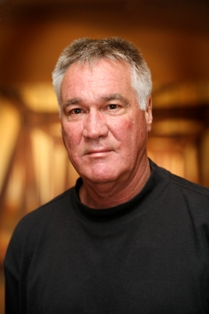Fierce, passionate NMSU English professor lit fire in student writers

Lee K. Abbott’s impact on students was indelible. After a lifetime writing award-winning short stories and teaching creative writing at universities across the country, Abbott returned to Las Cruces, where he grew up. His life ended in Columbus, Ohio where he was undergoing medical treatment. Abbott lost his battle with leukemia on April 29. He was 71.
Abbott is remembered for the energy and inspiration he gave his students. New Mexico State University students were among the last to benefit from his teaching.
“He was quirky – a tall drink of water, loved his bourbon, loved a cigarette,” said NMSU Master of Fine Arts graduate Barry Pearce when describing Abbott. “Words like gallant and gentleman come to mind. He was old school in some ways, but also utterly progressive, passionate about civil rights, women’s rights, income inequality.”
Abbott attended Las Cruces High School and graduated from NMSU with a bachelor's degree in 1970 and a master’s degree in English in 1973. He met his wife at NMSU and went on to receive a master’s of fine arts from the University of Arkansas. In 1989, he became a professor of English at The Ohio State University, where he remained until he retired in 2012.
In 2015, at the urging of NMSU English Department faculty, Abbott returned to teach at NMSU as a distinguished visiting professor.
“What set Lee apart was his national reputation as a master short story writer, as well as the fact that virtually every one of his short stories is set in Las Cruces, Deming or El Paso,” said Rus Bradburd, NMSU English professor and author of several books. “He dearly loved New Mexico and was proud of his ties to his alma mater.”
What Abbott didn’t tell students is that he was twice nominated for a Pulitzer Prize. “Just shows how modest he really was,” Pearce said. “He never bragged, never brought up his own work or his many honors. He preferred talking about you, your story, your work.”
Another of Abbott’s master’s of fine arts students, Em Haymans, recalled his intensity.
“He loved fiercely,” Haymans said. “He carried stories of all the people and places and books that he loved with him wherever he went, and he loved to share them.
“Lee was an author who celebrated language and life in a way that is hard to find now. I appreciated his respect for stories new and old, his appreciation for newer forms of writing even as he taught us the ways he learned to write. Most of all, he was a great teacher who didn't make a big fuss about himself. He was refreshing to work with in a field full of pretentious people.”
Abbott’s short stories and essays appeared in Harper's, The Atlantic Monthly, The Georgia Review and The New York Times Book Review among others. His fiction was often reprinted in The Best American Short Stories and The Prize Stories: The O'Henry Awards. His last collection of stories, “All Things, All at Once: New & Selected Stories,” was published by Norton in 2006.
“It’s hard to pick one outstanding talent – there were so many,” Pearce said. “Lee was often really specific and concrete in his advice, which is really valuable and unusual in creative writing. Lee had a great grasp of the big picture, but he would also tell you, ‘that stretch of dialogue from page 9 to 11 goes on a full page too long’ or ‘I think you could use three or four more lines of description at the start of Chapter 2.’”
Abbott’s colleagues remember his talent, his humanity and his obsession with his craft.
“Lee could be both blunt and generous, open-minded and rigid,” Bradburd said. “He conjured up the oldest kind of magic in storytelling, focusing on the human heart, yet his sentences were fresh, lively, and energetic. He has to be considered the greatest New Mexican short story writer in history.”


